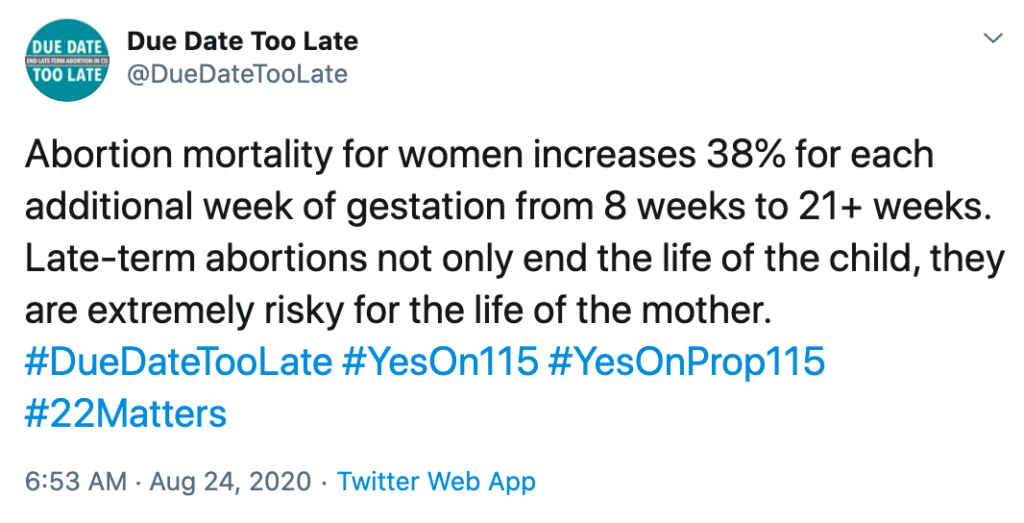The myth that abortion causes vast negative physical and psychological side effects is frequently parroted by anti-abortion activists, who falsely claim that abortion can cause everything from breast cancer to suicide.
Proponents of Colorado’s Proposition 115 ballot measure have also taken up this line of attack against abortions later in pregnancy.
Prop. 115 would ban abortions at 22 weeks of pregnancy, with no exceptions for rape, incest, a lethal fetal diagnosis, or non-fatal threats to a pregnant patient’s health. The only exception is for cases where an abortion is immediately necessary to save the patient’s life, but some doctors say this exception is too narrow to provide any meaningful protection for patients who face life-threatening pregnancy complications.
The notion that abortion later in pregnancy harms women is one of the proponents’ key arguments for the measure (in addition to claiming that a fetus is viable at 22 weeks, and, of course, their view that a fetus should have the same legal protections as citizens).
The website for the campaign advocating for the initiative, called Due Date Too Late, states that “late-term abortion is dangerous and it poses a substantial and medically documented immediate risk to the health and life of the woman,” and that “research/studies show that women suffer emotional trauma and psychological pain after having an abortion.”
It also claims that “women are more likely to die from late abortion (after 22 weeks) than from childbirth.”
Spokespeople for the campaign also repeatedly make these claims during interviews.
In a recent interview with KUNC, Giuliana Day said that after an abortion later in pregnancy, the “woman suffers a great deal and she is going to feel that pain and emotional, psychological pain for the rest of her life.”
In an interview with 630 KHOW’s Dan Caplis, Deacon Geoff Bennett of the Denver Archdioceses’ Respect Life office said, “At the end, moms are going to have to live with it the rest of their life, and they deal with depression and all kinds of issues because nobody helps work with them and says hey, deliver this baby, whether you have two days, two hours, or two years with them, you will never regret delivering your child.”
In a recent tweets, Due Date Too Late went so far as to claim that there is “nothing” worse for a mother’s mental health and that abortions later in pregnancy are “extremely risky” for patients’ lives.


The campaign refused to comment on this story and declined to produce the research they say supports their claims.
In fact, there is broad scientific and medical consensus that abortion is much safer than childbirth, including abortion later in pregnancy, and that abortion does not cause mental health issues.
Study after study has debunked the myth that abortion causes mental health problems, including abortion for reasons of fetal anomaly.
Regarding physical health, researchers have found that women are 14 times more likely to die due to complications from childbirth than from abortion complications.
While it is true that the chances for serious complications from abortion increase as gestational age increases, “that risk is nowhere near the risk of childbirth,” said Dr. Diana Greene Foster, who’s the director of research at the University of California San Francisco’s Advancing New Standards in Reproductive Health (ANSIRH) and a professor in the Department of Obstetrics, Gynecology and Reproductive Sciences.
Speaking at a virtual press conference organized by the No on 115 campaign today, Foster dispelled the myth that abortion harms women–and underscored the harm done by denying abortions to those who seek them.
Foster led the Turnaway Study, a nationwide study of the health and well-being of women who received and who were denied wanted abortions.
The study compares various health and life outcomes for those two groups of women, and Foster said that the study particularly focuses on women who were denied abortion care due to laws limiting abortion after a certain gestational age, usually around 22 weeks, like Colorado’s Prop. 115.
Foster said there were no significant differences in the long-term mental health of the two groups.
“We measured depression, anxiety, suicidality, self esteem, post traumatic stress, and on none of those did we find a difference over time between those two groups, except that in the very short time after being denied an abortion, women who were denied an abortion had higher anxiety and lower self esteem,” Foster said. “Being denied an abortion, having to look for an abortion, is an extremely anxiety-provoking situation.”
“The experience of seeking an abortion is the difficult one,” Foster said.
Foster emphasized that those who were denied an abortion were more likely to have physical health consequences. Two of the patients that they followed who were denied abortion care eventually died due to complications from childbirth, she said.
The study also found that being denied an abortion had serious negative effects on peoples lives that weren’t directly related to physical or mental health.
“Over the five years that we followed them, they were more likely to live in poverty, they were less likely to be able to hold a full-time job, they were less likely to set aspirational life plans for that five years and less likely to have quality romantic relationships,” Foster said. “We even saw differences in their ability to take care of their existing children and their chance at having wanted children within the five years.”
The bottom line: there’s no evidence to support the Prop. 115 campaign’s argument that abortion later in pregnancy harms women, but there’s good evidence to suggest the opposite.




